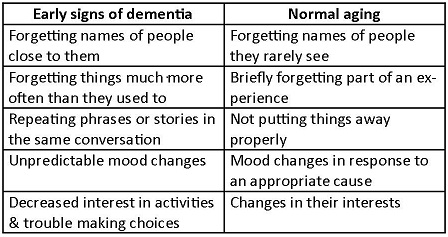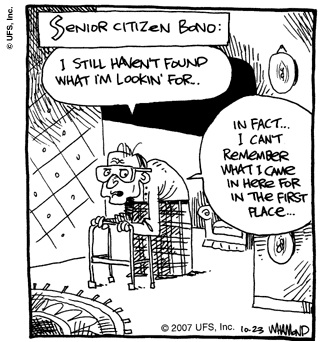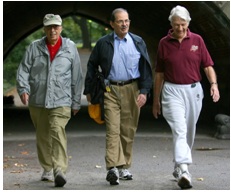Carers Guide to Dementia
Carers Guide to Dementia File:Carer and dementia.jpg[1][edit | edit source]
Facts & Figures [edit | edit source]
Dementia is a disease of the brain that is progressive and degenerative. It is characterised by changes in reasoning, memory, comprehension, problem-solving, and/or attention. It is a disease which is seen more in older people but is not a part of the normal ageing process [2].
- 750,000 people are living with dementia in the UK at present. This figure is expected to double over the next 30 years.
- As of 2010, 35.6 million people worldwide have dementia. www.alz.co.uk/research/statistics (The Global Voice on Dementia).
- 25% of hospital beds are occupied by people over the age of 65 with dementia [3].
This resource will help you to: [edit | edit source]
- Recall the different stages of dementia and recognise how they apply to the person you are caring for.
- Differentiate between the ‘normal’ aging process and the typical signs and symptoms of dementia.
- Recognize other conditions that may co-exist alongside dementia.
- Identify strategies and techniques that enable you to help someone with dementia to optimize their independence and quality of life.
- Identify dementia services and resources that would be appropriate for the different stages of dementia.
- Relate the information in this resource to your individual circumstances.
Recognition [edit | edit source]
Types of Dementia[edit | edit source]
There are many types of dementia. More than 50% of all cases of dementia are thought to be due to Alzheimers disease while 10% are due to stroke. In some cases, the cause may be another disease (eg. Huntington's disease) or from a head injury.
•Dementia with Alzheimers disease: the most common form of dementia. Loss of nerve tissue along with changes in the chemistry and structure of the brain lead to the death of brain cells.
•Vascular dementia: most common after a stroke or a series of small strokes. The blood supply and oxygen supply to the brain is effect and brain cells die. The person may start to forget or have trouble planning ahead. Balance problems can also occur.
•Dementia with Lewy Bodies: caused by the breakdown of brain tissue following the formation of abnormal structures in nerve cells. The person will move slower and fall more often.
•Fronto-temporal dementia: damage to the front part of the brain causes personality and behaviour changes. Memory is less likely to be affected in the early stages.
•Mixed dementia: has the characterisitcs of both Alzheimers and vascular dementia. The person may present with a mixture of symptoms.
•Less common causes of dementia:
- Motor Neurone Disease
- Multiple Sclerosis
- Huntington's Disease
- Parkinson's Disease
- HIV related cognitive impairment
- Creutzfeldt-Jakobs disease.
•Korsakoff's Syndrome: caused by heavy drinking over a long period that leads to brain cell death and short-term memory loss. Although not strictly classified as a dementia, it is included here as symptoms are similar.
For more informtaion and fact sheets on the different types of dementia visit this site: http://alzheimers.org.uk/site/scripts/documents.php?categoryID=200362
Early Signs of Dementia [edit | edit source]
Concern about the possibility of dementia occuring with advancing age is normal. It is important to understand the difference between 'normal aging' and the early onset of dementia. However, there are some aspects of the usual aging process that may be confused for signs of dementia.
Mild Cognitive Impairmentis a term used to describe a condition involving problems with mental abilities such as thinking, knowing and remembering. People with mild cognitive impairment often have difficulties with day-to-day memory, but these problems are not bad enough to be defined as dementia (reference: http://www.alzheimers.org.uk/site/scripts/documents_info.php?documentID=120
The table below shows some of the early signs of dementia and compares them to normal aging.
What to expect [edit | edit source]
A diagnosis of dementia can be daunting. It can sometimes be difficult accept the changes that occur as the disease develops. This section provides information to help you understand what happens at the various stages of dementia and why.
The three stages of dementia[edit | edit source]
This table shows the 3 main stages of dementia and what you may expect in each stage. It is available here as a document if you wish to print it off or save it for future reference.
The three main stages of dementia
Some symptoms may appear earlier or later than indicated on this table and the stages may overlap. Progression through the stages varies from person to person and depends on many factors including:
1. the type of dementia
2.ages of onset
3.the presence of other illnesses
4.the level of support and care available
http://www.psychiatry24x7.com/bgdisplay.jhtml?itemname=dementia_symptoms#stages
Falls[edit | edit source]
In those over the age of 65:
- 1 in 3 women will fall
- 1 in 5 men will fall
- The risk of falling increases if the person is also suffering from dementia (NEED A REFERENCE FOR THESE FIGURES)
It is important that the fear of falling does not lead to inactivity in the person with dementia, as this can lead to complications in physical health. To help avoid inactivity you should focus on:
- improving the person's mobility,
- maintaining their independence and confidence.
The ultimate aim is to reduce the fear of falling and maintain function.
Other things to expect[edit | edit source]
People with dementia may suffer from depression and/or behavioural problems.
They may often become annoyed easily or act aggressively towards a family member or friend.
What Can Physiotherapy Offer?[edit | edit source]
Physiotherapists use physical approaches to restore 'physical, psychological and social well-being, taking into account of variations in health status'. [1] Physiotherapy plays an important role in promoting and maintaining mobility in individuals with dementia. Physiotherapy interventions improve the quality of life for people living with dementia and reduce the burden of care. For a leaflet on dementia and physiotherapy follow this link:
http://www.csp.org.uk/professional-union/practice/evidence-base/physiotherapy-works/physiotherapy-works-dementia-care
Benefits of Exercise[edit | edit source]
Exercise prevents and reduces the risk of developing heart and lung disease.
It can also prevent chronic conditions such as diabetes and osteoporosis [6].
Physical exercise can improve
walking,
mobility,
flexibility,
balance
prevents falls in individuals living with dementia.
It is also shown to enhance mood and improve mental function [7].
Physiotherapy
[edit | edit source]
The aim of physiotherapy is to increase a persons mobility and lower their risk of falls by doing prevention exercises. Mobility can be increased with balance, stretching, strengthening exercises and the use of walking aids. Poor balance is known to increase the risk of falls and can be improved by physiotherapy-led exercises. A physiotherapist will assess activities such as; walking, going up and down stairs, getting out of a chair and getting in and out of bed. Physiotherapy reduces the burden of care through educating carers to encourage independence in people with dementia.
Physiotherapy can provide;
•Strengthening exercises
•Stretching
•Balance
•Flexibility
•Maintenance of independence
•Postural management
-->Regular change in body position is essential for comfort and prevention of poor posture which may lead to muscle tightness and spasms, decreased movement of joints and pressure sores. (NHS Postural Management Survey 2012)
- Advice and recommendations on aids;
--> Equipment and adaptations at home will help make life easier for your loved one with dementia and keep them independent for as long as possible
- Falls prevention program;
--> Created and used along with the home assessment. This will help to reduce the persons risk of falls as well as their fear of falling and keep them safe and independent at home.
Physiotherapy can help to manage pain. Pain affects cognition, motivation and will affect how the person with dementia responds to any rehabilitation programme. Individuals living with dementia who experience impairments in verbal communication may not be able to easily report pain and are at risk of receiving inadequate medication and treatment of pain. It is important that pain should be assessed before and during interventions to allow rehabilitation [8].
Physiotherapy also plays an essential role in:
- Promoting and maintaining mobility for people with dementia, by managing positioning, seating and painful contractures.
Exercise can have a significant and positive impact on behavioural and psychological symptoms of dementia, improving function and mood. This in turn may decrease the need for pharmalogical intervention [9].
What You Can Do[edit | edit source]
When caring for someone with dementia it is important to help them remain as independent and healthy as possible. They should continue to enjoy their usual activities as the better they feel the more they can enjoy life.
The aim of treatment is to slow down the progression of dementia related impairments and control behavioural symptoms. http://www.psychiatry24x7.com/bgdisplay.jhtml?itemname=dementia_treatmemt
Learn about the disease[edit | edit source]
By learning as much as you can about the disease, you will know what to expect and be better able to handle the challenges associated with dementia. By reading this website you have already taken the first step.
•Create a daily routine with small rituals[edit | edit source]
Predictability can be calming. This may help to relax the person.
•Let the patient do as much as they can independently [edit | edit source]
1.Give the person a role/task; doing the washing up, peeling the vegetables, pairing socks.
2.Do less for them
3.Keep tasks meaningful
4.If motivation is an issue, make the tasks functional; walk to the kitchen to get a drink instead of carrying it to them.
5.If the person is wandering around or restless, then think about why this might be hapenning. Some people walk because they are bored, have excess energy or it may be a reaction to an hallucination.
By allowing them to do as much as possible by themselves, they will be more likely to retain his/her self esteem.
•Plan activities that you can both enjoy[edit | edit source]
If it is realistic to do so, take the person for a walk each day. It will burn off energy and the fresh air will do you both good.
Other activities can include gardening, baking, listening to music, singing, dancing or playing cards. What is important is that the person is participating in an activity that makes him/her feel useful.
•Assess the home [edit | edit source]
The home can be full of potential hazards contributing to falls. Make sure there is nothing around the house that the person could trip up on.
Communication:[edit | edit source]
1.Keep commands simple, one request at a time.
2.Allow extra time for a response to your question before repeating it.
3.If the individual doesn't appear to understand your request, try rephrasing it.
4.Don't chat whilst the person is trying to perform a task, this will likely be a distraction.
5.Make sure communication problems are not due to visual or hearing impairments. Check that glasses and hearing aids are in good working order.
6.Use names and explanatory phrases where possible, such as "Your son, John."
•Other forms of communication which may be useful:[edit | edit source]
1.Touch can be used to assist movement through directional guidance during walking by placing a hand on their shoulder or by taking their hand.
2. Sounds can provide an extra stimulation to encourage normal movement or to trigger an appropriate response to an instruction. Some peoples walking can improve by providing an external rhythm for example counting aloud or by playing music with a rhythm appropriate to the speed of a person’s walk.
3.Visual stimuli can be used to demonstrate instructions. When performing exercises it is more effective to demonstrate the exercise than to give instructions [10].
Mood is usually affected in individuals coping with dementia. Individuals can often become flustered and distressed and in some cases can become aggressive and depressed. Regular movement will balance their mood help to reduce depression and keep them calm. Activity can help improve sleep pattern which can often be disturbed by dementia. Regular routines can include household activities, exercise classes, resistance training and stretching. http://www.healthcentre.org.uk/physiotherapists/physiotherapist-dementia.html
Behaviour management is one strategy that may be used to decrease depression in people with dementia and can be carried out by either carers or family. It is suggested that the reduction of repetitive verbalisations, management of agression and management of eating behaviours in people with dementia has a positive effect on their behaviour and overall well-being [11].
Where you can get help [edit | edit source]
Use this page to find organisations that offer help and support.
Familly members or those caring for a person with dementia are often subject to extreme stress. Remember you cannot help someone else if you do not help yourself first!
- Join a caregiver support group: This can provide emotional support from others in a similiar situation, provide education and also give you connections to local useful resources.
Helpful Websites[edit | edit source]
A charity that works across all age ranges and all aspects of mental health. Type “Dementia” in to the search box for helpful information and publications relating to dementia.
http://www.alz.co.uk/ADI-publications
An international website dedicated to Alzheimer’s Disease. Contains information and support networks for those suffering from the disease and those who are care for loved ones
www.tinyurl.com/krcyhg
The Alzheimers Society. Dementia UK, The full report 2007: This document is an in-depth report on dementia and Alzheimers in the United Kingdom.
NHS & Government Information and Support[edit | edit source]
For NHS information about dementia follow this link
http://nhs.uk/conditions/dementia/pages/introduction.aspx
For NHS information about support for carers, care homes and financial support follow this link http://www.nhs.uk/carersdirect/Pages/CarersDirectHome.aspx
For NHS information about health services near you follow this link
http://www.nhs.uk/carersdirect/Pages/CarersDirectHome.aspx
For information on dementia in Scotland and the Scottish government dementia strategy follow this link http://www.scotland.gov.uk/Topics/Health/Services/Mental-Health/Dementia
Voluntary Sector Organisations[edit | edit source]
For information about Alzheimers follow this link http://alzheimers.org.uk
For information about the Lewy Body Dementia Association follow this link http://lbda.org/
For information about the Parkinson's Disease Foundation and research into the disease follwo this link http://pdf.org.uk/
For information about Parkinson's disease and support avalable follow this link http://parkinsons.org.uk/
For information about Huntingtons's disease and support in England & Wales follow this link http://hda.org.uk/
Financial Assistance[edit | edit source]
Learn about financial support you may be able to access (UK only):
http://www.nhs.uk/CarersDirect/moneyandlegal/carersbenefits/Pages/Overview.aspx
http://www.nhs.uk/carersdirect/moneyandlegal/carersbenefits/Pages/CarersAllowance.aspx
Carers Support Networks [edit | edit source]
Carers UK is a charity set up to help carers. This website provides information and advice about caring, alongside practical and emotional support for carers. There is an online community network where you can chat online with other carers and share your experiences.
http://www.carersuk.org
This is an international carers support network that provides support and friendship between carers online.
http://www.carersconnectint.com/Home.aspx?pid=10
Alzheimers and Dementia Support Services (ADSS) is a charity that provides support for carers including a 24 hour help line (0800 500 3014). Calls are free from a landline within the UK but a charge may be incurred from moblies.
www.alzheimers-dementia.org.uk
References[edit | edit source]
- ↑ http://www.google.co.uk/imgres?num=10&hl=en&biw=1366&bih=667&tbm=isch&tbnid=u3Y-xR2XvBwlOM:&imgrefurl=http://www.nuffieldbioethics.org/dementia/dementia-making-decisions&docid=uC7KoG97Yz5_yM&imgurl=http://www.nuffieldbioethics.org/sites/default/files/images/Dementia%252520-%252520female%252520carer(1).jpg&w=424&h=283&ei=HL6bUJWLFeWc0QWAnYCIDQ&zoom=1&iact=rc&dur=298&sig=116958702338474542149&page=1&tbnh=142&tbnw=215&start=0&ndsp=25&ved=1t:429,r:19,s:0,i:192&tx=134&ty=72
- ↑ NHS Choices 2012. www.nhs.uk/conditions/dementia/pages/introduction/apsx (accessed 21/10/2012)
- ↑ Chartered Society of Physiotherapy 2012 http://www.csp.org.uk/publications/physiotherapy-works-dementia-care (accessed 21/10/2012)
- ↑ http://www.onmemory.ca/en/signs_symptoms/aging_vs_alzheimers/ (accessed on 21/10/2012)
- ↑ http://www.psychiatry24x7.com/bgdisplay.jhtml?itemname=dementia_memoryloss
- ↑ Heyn, P., Abreu, B.C. and Ottenbacher, K.J. 2004. The Effects of Exercise Training on Elderly Persons With Cognitive Impairment and Dementia: A Meta-Analysis. Archive of Physical Medicine and Rehabilitation. Vol 85, pp. 1694-1704.
- ↑ Toulette, C., Fabre, C., Dangremont, B., Lensel, G. and Thevenon, A. 2003. Effects of physical training on the physical capacity of frail, demented patients with a history of falling: A randomised controlled trial. Age and Ageing. Vol 32, pp. 67-73
- ↑ Marshall, M. 2005. Perspectives on Rehabilitation and Dementia. [Online book] London: Jessica Kingsley. Available at: http://books.google.co.uk/books/about/Perspectives_On_Rehabilitation_And_Demen.html?id=KqhaW28SZ8oC [Accessed November 05 2012]
- ↑ Oddy, R. Promoting mobility for people with dementia: a problem-solving approach. 3rd edition. London. Alzheimer's society. 2011.
- ↑ Marshall 2005
- ↑ SIGN Guidelines, 2006. Management of patients with dementia: A national clinical guideline. NHS Scotland.









